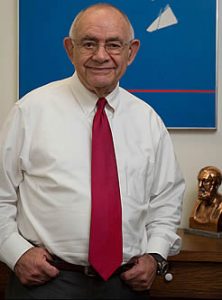Pories honored for career of discovery
Dr. Walter J. Pories, a surgeon and researcher, has received the 2012 Lifetime Achievement Award for Research and Creative Activity from East Carolina University.
Pories, 82, is a professor of surgery, biochemistry and sport and exercise science at ECU.
In addition to being a scientist and physician, he’s also a painter.

Dr. Walter Pories poses in front of one of his paintings in his office at the Brody School of Medicine. Photo by Cliff Hollis
Pories recently answered some questions about his career and what’s next for him.
Q: As a medical student, you conducted research showing that zinc was a vital nutrient in livestock and people. How important is it to not only be a physician but also a researcher?
A: Everybody is a scientist. If you tried two spoonfuls of sugar in your cup of coffee instead of one, you’re a scientist. Children bouncing a ball, damming a creek, building, catching fish are all budding scientists. We need to reward that joy. And if they do mess up, instead of getting angry, ask, “What did you learn?” All really good physicians are scientists as well.
Q: What have been the top two or three highlights of your career?
Seeing a patient get better. That’s an incredible reward. You operate on a baby with a congenital defect, and you come back three or four hours later and the baby is hungry and wants something to drink. That’s amazing.
Making a difference with students. There is great joy in restoring a student’s confidence, in broadening his outlook, in validating her capabilities to manage difficult concepts. Teaching is such a privilege.
Making a difference in society. You get a whole lot more back than you give. When my mentor, Dr. (William) Strain (at the University of Rochester) and I discovered that zinc was an essential element for animals and man, we showed that two cents worth of zinc added to a ton of feed increased feed efficiency by 20 percent, brought broilers to market in six rather than 10 weeks and accelerated first egg laying by 45 days, we made a difference in food production around the world. That’s very rewarding and made the effort of testing that thesis very worthwhile.
Q: What are the main things you stress to students and residents?
A: I think the word “care.” It’s one thing to render care. It’s another thing to really care. (Pories’ daughter Dr. Susan Pories is a surgeon and editor of “The Soul of a Doctor: Harvard Medical Students Face Life and Death.”) She tells students every patient has a story. If you don’t know the story, you don’t know the patient. It’s getting that story that makes you a physician. The real surgeon is a family physician who knows how to operate.
Pories retired from operating at age 70 but still follows up with former patients and has continued with research related to his Greenville Gastric Bypass and diabetes. He did not want to speak on the record about his latest research until it is published, but he and longtime collaborator Dr. Lynis Dohm, a research professor in the Department of Physiology at the medical school, have been studying ways to create a medicine that will mimic the remission of diabetes that follows gastric bypass surgery.
“I can barely go to sleep at night,” Pories said of his current research. “Wouldn’t you be excited?”
The wonders of nature and discovery aren’t limited to Pories’ lab. Recently, one of his cows gave birth.
“The calf got up and was attached to the mother still with the umbilical cord,” he said. “Can you imagine? Eventually, it fixed itself. We have a lot to learn from nature.”
Dr. Walter Pories
Born in Munich, Germany.
Family: Mary Ann Rose, professor and interim associate dean, ECU College of Nursing
Five daughters, one son
College: Wesleyan University, Middleton, Conn.
Medical school, residency and fellowship: University of Rochester, Rochester, N.Y.
Military service: U.S. Air Force (ret.)